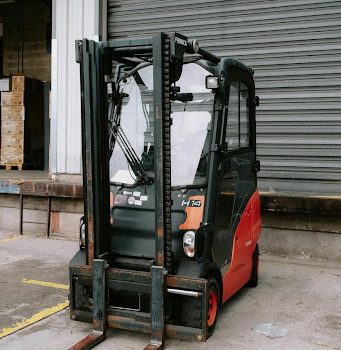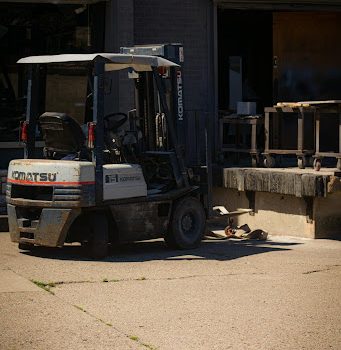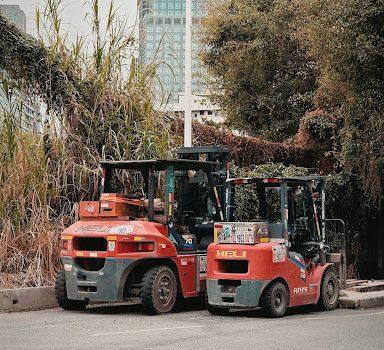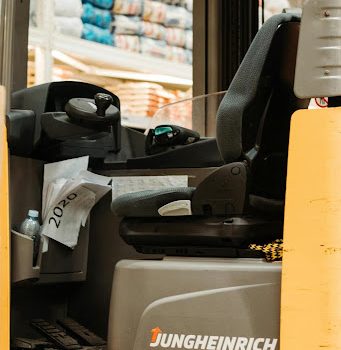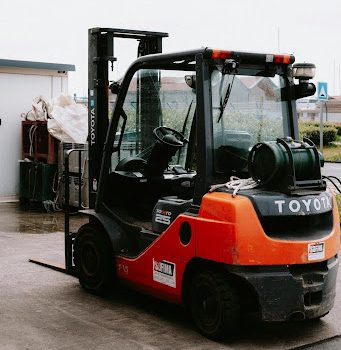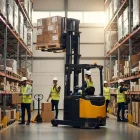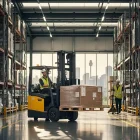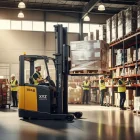The Pros and Cons of Buying Used Forklifts for Sale
In the world of material handling, forklifts are a crucial asset. They streamline operations, boost productivity, and enhance safety.
But buying a new forklift can be a significant investment.
This is where used forklifts for sale come into play. They offer a cost-effective solution for businesses looking to optimise their operations without breaking the bank.
However, purchasing a used forklift isn’t a decision to be taken lightly. It comes with its own set of pros and cons that potential buyers need to consider.
In this guide, we’ll delve into the advantages and disadvantages of buying used forklifts. We aim to provide you with the necessary information to make an informed decision.
Whether you’re a business owner, a warehouse manager, or a logistics professional, this guide will help you navigate the world of used forklift sales.
Understanding the Value of Used Forklifts
Used forklifts can be a wise investment for many businesses. They provide a way to acquire necessary equipment at a fraction of the cost of buying new. This allows companies to allocate their resources elsewhere and maintain budget flexibility.
When considering used forklifts, it’s important to recognise their intrinsic value. Here are a few key benefits:
- Cost-effectiveness: Save money upfront for other operational needs.
- Reduced depreciation: Avoid steep value drop common with new forklifts.
- Availability of high-end models: Access premium forklifts that might otherwise be too pricey.
Understanding these values helps you see why many opt for used over new.
Advantages of Buying Used Forklifts
Choosing used forklifts offers a range of benefits that can align perfectly with business goals. It’s a strategic decision many companies make, especially those focused on cost management.
One of the main advantages is the immediate financial relief it provides. Investing in used forklifts can free up capital, allowing businesses to allocate resources where they are most needed.
In addition to cost savings, buying used forklifts opens up access to high-quality models. Often, high-end forklifts are unaffordable when new, but become attainable in the used market.
Moreover, used forklifts typically depreciate at a slower rate than new ones. This means businesses retain more value, even if they choose to sell the forklift later.
Thus, purchasing used forklifts can be a smart move, offering advantages such as:
- Financial savings
- Access to upscale models
- Better depreciation rates
Cost Savings
Opting for used forklifts can significantly reduce initial capital outlay. This is critical for small and medium-sized enterprises aiming for budget efficiency.
With the money saved, companies can invest in other areas of need, like hiring skilled staff or upgrading technology. This choice enhances financial fluidity, vital for sustainable operations.
Access to High-End Models
Purchasing used forklifts can pave the way to owning high-end models that might otherwise be unattainable. Many businesses find this advantageous when looking for specific features and performance levels.
High-end models often boast superior capabilities. Having access to these at a fraction of the new price can enhance operational productivity and efficiency.
Lower Depreciation Rates
The depreciation of forklifts occurs most rapidly in the first year of use. By purchasing used, you sidestep this initial steep depreciation curve.
This slower depreciation means a more stable asset value. Should you later decide to resell, the retained value offers potential financial recovery, making it a sound investment strategy.
Disadvantages of Buying Used Forklifts
While used forklifts offer appealing benefits, they also come with some risks. Understanding these drawbacks is crucial for making a balanced decision.
One major issue is the potential for higher maintenance costs. Used forklifts often require more frequent repairs, leading to unexpected expenses.
Another challenge is the lack of warranty which can lead to higher risks for unforeseen damages or failures. Without a warranty, businesses must shoulder repair costs entirely.
Additionally, the history and longevity of a used forklift can be uncertain. Previous use, maintenance history, and overall wear are not always transparent.
To summarise, the downsides of opting for used forklifts include:
- Increased maintenance needs
- Absence of warranty
- Unclear history and durability
Potential for Increased Maintenance
Older forklifts are more likely to need repairs over time. This can disrupt your operations and increase operational costs, influencing your budget planning.
Routine maintenance may also become more frequent, requiring skilled technicians. This need can escalate long-term expenses and lead to potential downtime
Lack of Warranty
Purchasing a used forklift often means foregoing a warranty. This absence places the responsibility for potential breakdowns squarely on the buyer.
When problems arise, it falls upon the owner to cover repair costs. Without a warranty, these expenses can quickly escalate, affecting financial resources.
Uncertain History and Longevity
The history of used forklifts can sometimes be elusive. Without clear maintenance records, assessing previous use and care becomes difficult.
This uncertainty over a used forklift’s past can affect its future performance and life span. It may mean unexpected replacements or repairs sooner than anticipated.
Key Considerations When Purchasing a Used Forklift
When buying a used forklift, several factors must be evaluated to ensure a worthwhile investment. These considerations help mitigate risks and maximise potential benefits.
Firstly, a thorough inspection of the forklift is essential. This helps identify any existing issues or wear that could impact performance.
Next, understanding the total cost of ownership is crucial. Factor in expenses such as maintenance, repairs, and insurance when budgeting for a forklift.
Lastly, evaluate the reputation of the seller. A reputable seller will offer transparency and reliable information about the forklift’s condition.
Key considerations to keep in mind include:
- Thorough inspection of condition
- Calculating total ownership costs
- Assessing seller reputation
Inspecting the Forklift’s Condition
A detailed inspection is the first step in purchasing a used forklift. Focus on key areas like the engine, tires, and hydraulic systems to ensure they are in good condition.
Check for signs of excessive wear or damage. Consider hiring a professional to conduct a comprehensive evaluation for peace of mind. This reduces the risk of acquiring equipment with potential mechanical issues.
Understanding the Total Cost of Ownership
When purchasing a used forklift, budget for more than just the purchase price. Consider ongoing expenses such as maintenance, operational costs, and any necessary repairs.
Calculate these factors to understand the forklift’s true cost over its lifespan. By anticipating these costs, you can make a more informed financial decision and avoid unpleasant financial surprises.
Evaluating the Seller’s Reputation
The seller’s credibility plays a vital role in the buying process. Research the seller’s history, read reviews, and ask for customer references to gather insights.
A seller with a strong reputation is more likely to provide accurate information and quality service. Prioritising this step can save you from future complications and enhance your buying experience.
Final Thoughts: Making an Informed Decision
Buying used forklifts can offer significant advantages, but it also comes with challenges. Weighing the pros and cons helps achieve a balance between cost and performance needs.
Taking time to research thoroughly can prevent costly mistakes. A well-considered purchase ensures that the forklift you choose is both reliable and suitable for your operations.
Ultimately, the goal is to secure equipment that enhances productivity at a reasonable price. Armed with the right information, you can confidently proceed with your forklift purchase decision.
FAQs About Buying Used Forklifts
Many questions arise when considering buying used forklifts. Below are answers to some of the most frequently asked questions.
What Should I Look for When Inspecting a Used Forklift?
Check for visible wear or mechanical issues. Ensure the forklift meets safety standards and has been well-maintained.
Are Used Forklifts as Reliable as New Ones?
If properly maintained, used forklifts can offer similar reliability to new models. Maintenance history is crucial.
Is Financing Available for Used Forklifts?
Financing options are often available. It’s important to explore different plans and choose the one that best fits your budget.
Do Used Forklifts Come with a Warranty?
Used forklifts typically lack warranties. It’s important to understand the risk involved when a warranty isn’t offered.
What is the Total Cost of Ownership?
Consider purchase price, maintenance, repairs, insurance, and fuel costs. Evaluating these factors helps in budgeting effectively.

